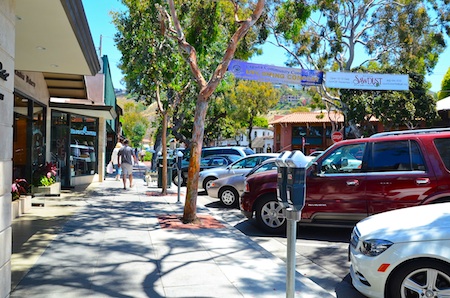
Laguna Beach is on track to allow new downtown businesses to open under looser permitting and parking rules, a move that city leaders hope will encourage entrepreneurs to fill vacant storefronts.
The Laguna Beach City Council voted 4-1 on Tuesday, Councilmember Toni Iseman opposed, to change components of the Downtown Specific Plan, a key document that governs development and commercial uses in Downtown Laguna.
The vote partly concludes a major topic of the 2018 city council campaign, delivering a significant victory for councilmembers Sue Kempf and Peter Blake who ran for public office on business-friendly platforms.
To officially adopt the changes, councilmembers are tentatively scheduled for a second procedural vote on July 28, City Clerk Lisette Chel-Walker wrote in an email Wednesday.
Mayor Bob Whalen said Tuesday that he saw controversy around conditional use permits prior to his first election to the City Council in 2012.
“I was on the Planning Commission for four years before getting on council and I thought micromanaging the contents of a store was kind of crazy,” Whalen said. “That’s just way to much focus and control for us to have as a city.”
At issue Tuesday was whether Laguna Beach should update the Downtown Specific Plan to limit the requirement to apply for a conditional use permit to new bars, restaurants, and live entertainment venues. All other commercial uses would be permitted-by-right, avoiding time-intensive, costly review by city staffers and the Planning Commission.
This permit change has seen widespread community support, including from Village Laguna.
“We agree that the [conditional use permits] should continue to be required for bars, restaurants, and other more intensive uses,” Village Laguna president Johanna Felder said Tuesday.
Councilmembers also slashed requirements for on-site parking, which has long been a barrier for new businesses to move into buildings that were developed without designated parking spaces.
Under the outgoing rules, retail business owners have to provide one parking space per 250 square feet of gross floor area. Likewise, food service businesses have to provide one space for every 100 square feet of gross floor area. To get around this requirement, business owners often elect to pay the city an in-lieu fee to help fund a future parking structure.
If formally approved, the new parking requirement would be three spaces for every 1,000 square feet of gross floor area, regardless of the commercial use.
Kent Russell, a Laguna Beach resident and downtown building owner, said he believed the time has come for the city to revise conditional use permits and parking requirements.
“Our parking code is being used as a weapon for more intensive uses and better uses coming to our downtown,” Russell said.
Lumberyard Restaurant owner Cary Redfearn also threw his support behind the Specific Plan changes.
“This is our opportunity to make Laguna relevant again,” he said.
Over the years, some residents have expressed concern that loosening these parking requirements would allow landlords to maximize their investment and collect top-dollar rents from new bars and restaurants.
Based on her recent conversations with Laguna Beach restaurant owners, Kempf was skeptical that such a proliferation of restaurants would actually occur. She highlighted how costly it is to convert a building to a restaurant.
“The question we’re going to get is ‘what are you going to do address these vacancies?” Kempf said. “And for that and other reasons, I’m keen to pass both of these changes.”
Iseman was reluctant to support the update to the Downtown Specific Plan, arguing the City Council should be able to exercise some discretion over the types of uses permitted in Downtown Laguna.
“I want to keep our eye on the prize, which is what our residents are being asked to sacrifice if we move forward with this,” she said.
The City Council still needs to hear public comments and deliberate on arguably the two most controversial components of the Downtown Specific Plan: building height limits and merging of parcels for redevelopment. A date for that conversation hasn’t been announced.




